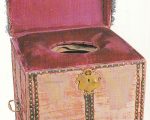
Sir Henry Norris was born sometime in the late 1490s and was the son of Richard Norris and grandson of Sir William Norris of Yattendon and his wife, Jane de Vere, daughter of John de Vere, 12th Earl of Oxford. Norris’s family had a long history of serving the monarch – his great-grandfather, Sir John Norris, had been Keeper of the Great Wardrobe to Henry VI and his grandfather, Sir William Norris, had been Knight of the Body to Edward IV. Sir William Norris had been attainted after being involved in the Duke of Buckingham’s rebellion against Richard III and had been forced to flee to Brittany, where he joined the forces of Henry Tudor and may even have fought at the Battle of Bosworth. Sir William had a command in June 1487 at Stoke and went on to become the Lieutenant of Windsor Castle.
[Read More...]
